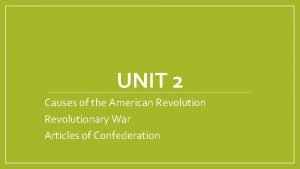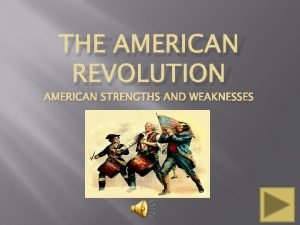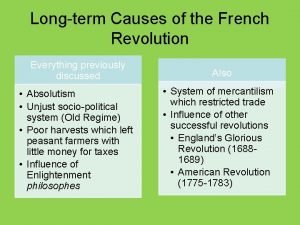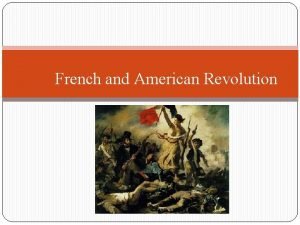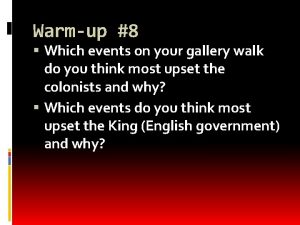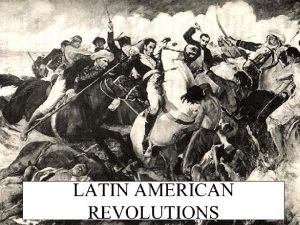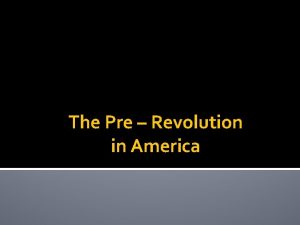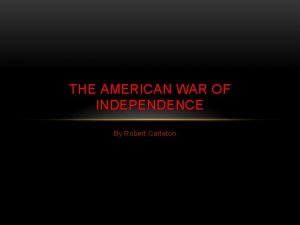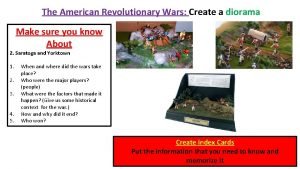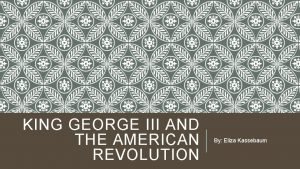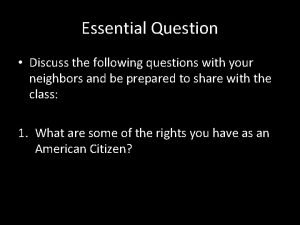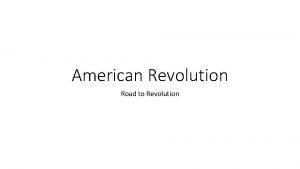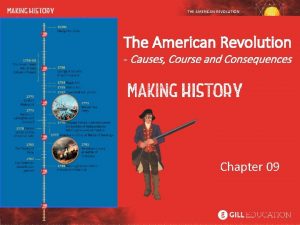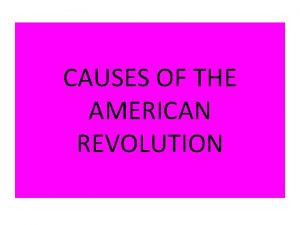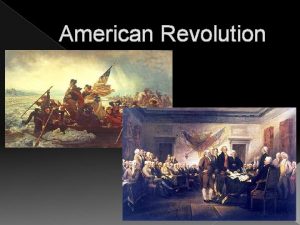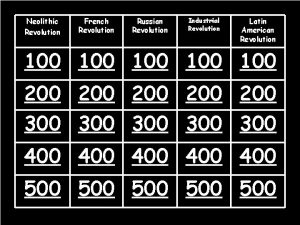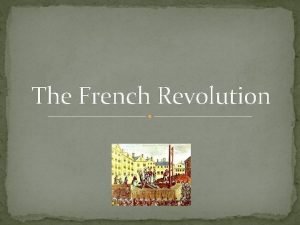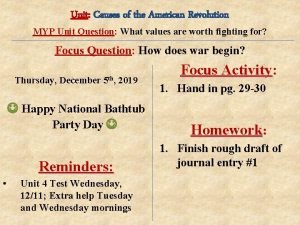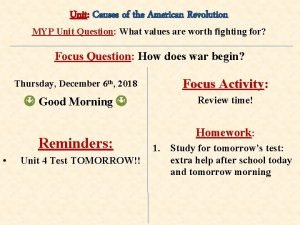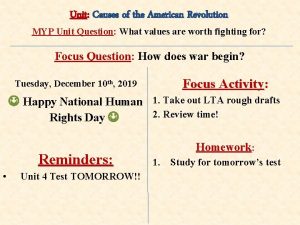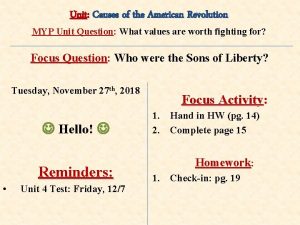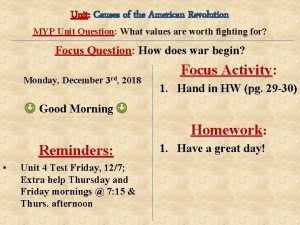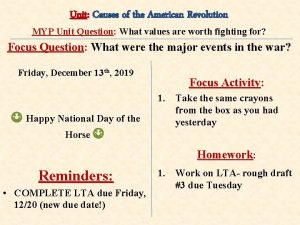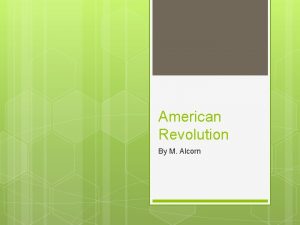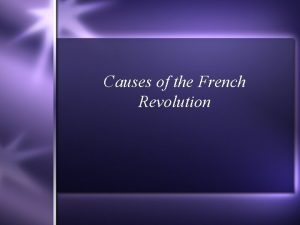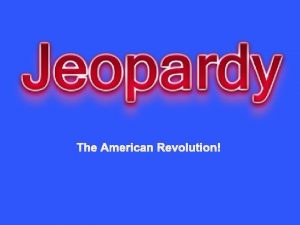American Revolution Causes Unit 4 Causes of the
















- Slides: 16

American Revolution Causes Unit 4

Causes of the American Revolution

King George III 1760 -1801 • Feared that the loss of one group of colonies would lead to the loss of another. • Maintained an aggressive policy against colonial resistance.

Mercantilism • Carefully controlling trade • Britain made it where the colonies could only trade with Britain and no one else. • Colonies were expected to be a source of raw materials for the “mother country” • Colonies were also expected to be the purchasers of manufactured goods from Britain

Proclamation of 1763 • British Parliament Law • Colonists were forbidden to settle west of the Appalachian mountains • Britain wanted a buffer zone between colonists and Native Americans • Colonists wanted to settle in the fertile Ohio River Valley

Stamp Act - 1765 • Required that all legal documents have an official stamp showing a tax had been paid. • British used this to make money after the French and Indian war. • The problem with this is that the colonists had absolutely no say in the taxes.

Civil disobedience • This is considered going against the government or rulers of the time. • The colonists decided to boycott British goods. • Boycott means refuse to buy. • The protests and demonstrations were considered civil disobedience.

Lack of Representation in Parliament • Since the colonies were formed, little systems of representative government had began. • Colonists were unhappy with Britain’s insistence of Parliament’s supremacy (taxation). • Colonists did not have direct representation in Parliament. • The slogan – “No Taxation without Representation” became popular throughout the colonies.

Patrick Henry • A member of the Virginia House of Burgesses • Spoke out against the Stamp Act • Famous quote, “Give me Liberty or give me death!” spread throughout the colonies during the war.

Townshend Acts - 1767 • Taxed imported glass, lead, paint, paper, and tea. • The money for these duties (taxes) paid for military costs and the salaries of colonial governors. • To enforce this, British officials used writs of assistance. • This allowed tax collectors to search for smuggled goods without a warrant.

Boston Massacre - 1770 • Tensions exploded between colonists and British troops sent to keep order. • A crowd gathered around a group of soldiers. • Colonists were shouting insults, throwing snowballs. • The mob grew louder and angrier. • Suddenly, soldiers fired into the crowd killing several colonist.

Propaganda • What makes this an example of propaganda? • One-sided (bias) • Made the British look like they had been ordered. • Colonists are fleeing

Tea Act - 1773 • To reduce tension in the colonies, Parliament repealed most of the Townshend Acts. • It kept a tax on British East India Tea. • The colonists were smuggling tea. • Britain made a deal with the British East India Company. • This made the smuggled tea more expensive than the British tea.

Boston Tea Party - 1773 • A political protest • Sons of Liberty • Men dressed as Native Americans dumped 342 chests of tea in the Boston Harbor. • Soon the streets echoed with shouts of “Boston Harbor is a teapot tonight!” • This was considered an act of civil disobedience.

Coercive/Intolerable Acts - 1774 • These acts were passed in response to the Boston Tea Party. • Boston Harbor was closed • Massachusetts charter was cancelled • Royal officials accused of crimes were sent to Britain for trial • Quartering Act – forced colonists to quarter troops • General Thomas Gage became the new governor of Massachusetts.

Tensions finally boil over.
 Did american revolution cause french revolution
Did american revolution cause french revolution Causes of the american revolutionary war
Causes of the american revolutionary war American revolution strengths and weaknesses
American revolution strengths and weaknesses American revolution causes and effects
American revolution causes and effects American revolution effects
American revolution effects Causes of the american revolution gallery walk
Causes of the american revolution gallery walk Cause of the latin american revolution
Cause of the latin american revolution Russian revolution vs french revolution
Russian revolution vs french revolution The third agricultural revolution
The third agricultural revolution Peter zenger american revolution
Peter zenger american revolution American revolution facts
American revolution facts Revolutionary war diorama
Revolutionary war diorama American revolution choice board
American revolution choice board Wentworth cheswell
Wentworth cheswell King during american revolution
King during american revolution American french revolution venn diagram
American french revolution venn diagram The american revolution chapter 6 section 4
The american revolution chapter 6 section 4

